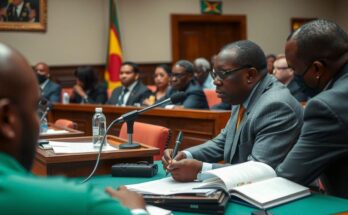Mozambique is poised for pivotal elections with an electorate of 17 million set to choose a new president and members of parliament amidst a jihadist insurgency and humanitarian challenges. Candidates are focusing on restoring peace and addressing corruption, with the ruling Frelimo party expected to maintain its power despite recent controversies.
Mozambique is preparing for significant elections amidst escalating challenges posed by a jihadist insurgency and severe food insecurity due to drought. Scheduled for Wednesday, the polls will allow approximately 17 million Mozambicans to select a new president, 250 members of parliament, and provincial assemblies. The incumbent president, Filipe Nyusi, is barred from running again after serving two terms. In the lead-up to the elections, the main candidates have pledged to prioritize tackling the violent insurgency that has plagued the northern province of Cabo Delgado for nearly seven years, although concrete plans remain absent. Since 2017, an Islamic State-aligned group has perpetrated heinous acts against local communities, resulting in the displacement of 1.3 million individuals, with around 600,000 having attempted to return to their war-torn homes. Daniel Chapo, the candidate representing the ruling Front for the Liberation of Mozambique (Frelimo), emphasizes that restoring peace in Cabo Delgado is essential for infrastructural development. In contrast, Lutero Simango from the Democratic Movement of Mozambique stresses the urgent need to address healthcare shortages, unemployment, and poverty. Independent candidate Venacio Mondlane asserts a bold promise to eradicate kidnappings and terrorism within his first year in office. Corruption and poverty are also pressing issues as Mozambique faces extreme food shortages impacting 1.3 million people, worsened by drought conditions linked to El Niño. Frelimo, which has maintained power since the nation’s independence in 1975, is expected to remain dominant despite recent allegations of corruption, notably the notorious “tuna bond” scandal, which resulted in significant financial turmoil. The Southern African Development Community has dispatched election observers to monitor the process, particularly in light of allegations surrounding previous local elections marked by fraud and violence.
The elections in Mozambique are set against a backdrop of significant socio-political turmoil, characterized by an ongoing jihadist insurgency in the northern Cabo Delgado province and widespread hunger exacerbated by severe droughts. For nearly seven years, the country has been grappling with attacks from an Islamic State-affiliated group, leading to mass displacements and humanitarian crises. Additionally, Mozambique is facing high unemployment, poverty, and Food insecurity, with 1.3 million citizens reportedly enduring severe food shortages. The ruling Frelimo party has been marred by controversies, including corruption scandals that have undermined trust in government institutions, thereby complicating the political landscape leading up to the elections.
The upcoming elections in Mozambique represent a critical moment for the nation as it seeks leadership capable of navigating its myriad challenges, including insurgency, poverty, and corruption. The candidates have placed significant emphasis on restoring peace and addressing critical issues affecting their constituents. However, concerns regarding electoral integrity and the historical dominance of the Frelimo party loom large, suggesting an uncertain path ahead for Mozambicans as they prepare to cast their votes.
Original Source: apnews.com




